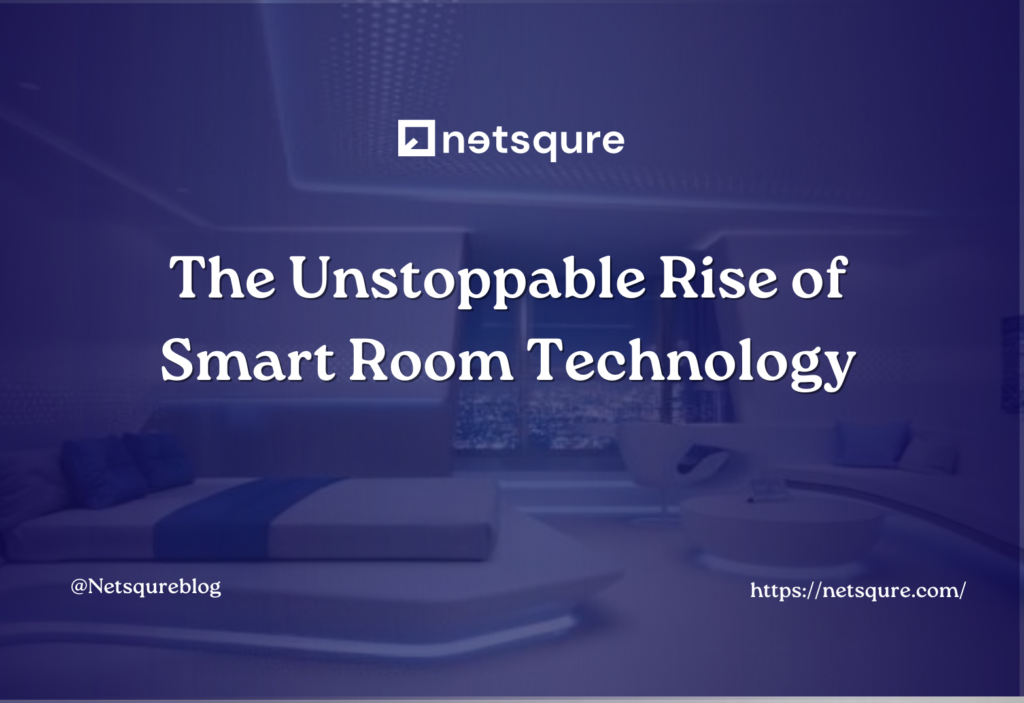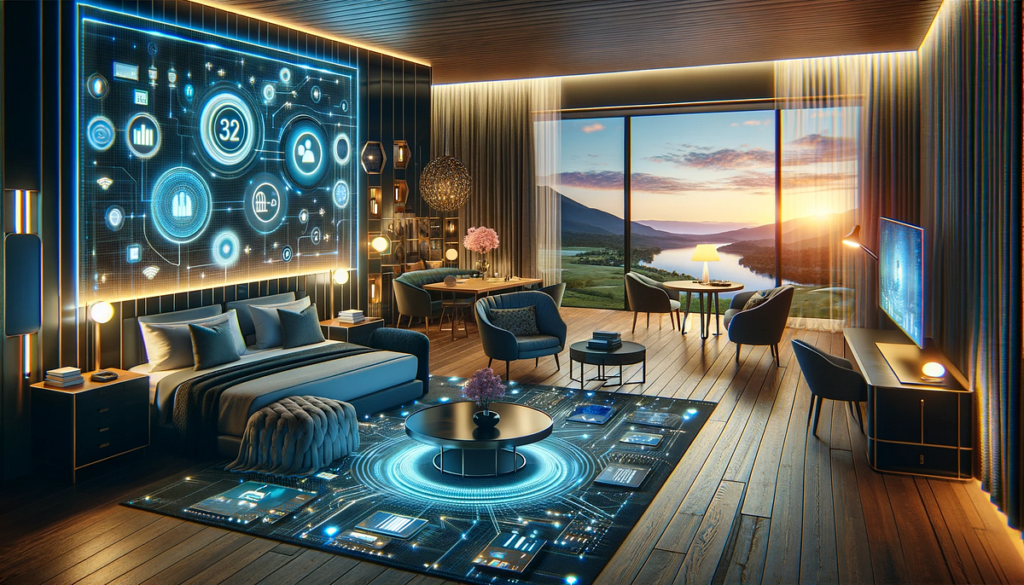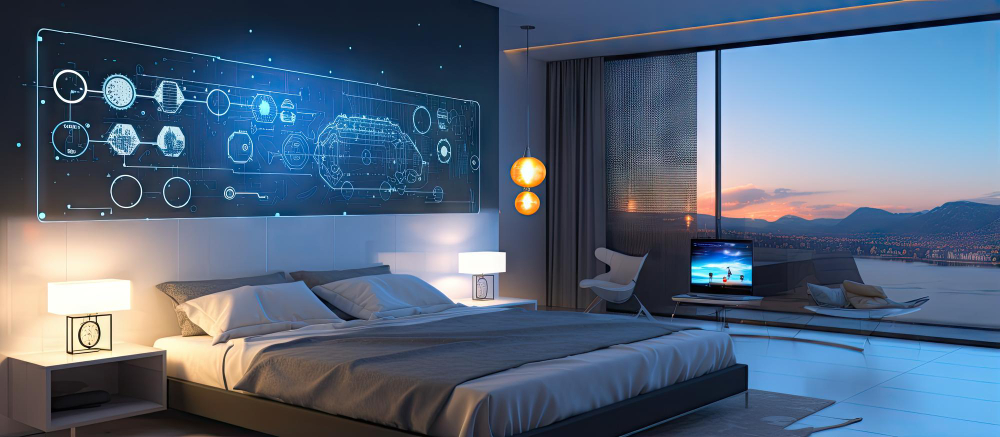
Table of Contents
In today’s rapidly advancing digital world, the hospitality industry is undergoing a significant transformation. Smart room technology, once a futuristic concept, is now becoming a standard in modern hotels. This blog delves into the concept of smart rooms, explores smart hotel technology, provides examples of innovative smart hotel rooms, and presents real-world use cases and market insights.
Market Revenue Matrix
The smart room technology market is experiencing significant growth, driven by increasing demand for personalized guest experiences and operational efficiency. Here’s a snapshot of the market trends:
- Market Size (2023): The global smart hotel market was valued at approximately USD 13.3 billion.
- Expected Growth Rate: The market is projected to grow at a compound annual growth rate (CAGR) of 15.1% from 2023 to 2030.
- Key Drivers: Growing adoption of IoT in the hospitality sector, increasing demand for energy-efficient solutions, and rising customer expectations for personalized experiences.
- Regional Insights: North America leads the market, followed by Europe and Asia-Pacific, due to the high adoption rate of advanced technologies in these regions.
- Top Players: Major companies leading the smart room technology market include Honeywell International, Schneider Electric, Johnson Controls, and Siemens AG.
What is the Concept of Smart Room?
Smart room technology are advanced spaces equipped with various interconnected devices and systems designed to enhance user comfort, convenience, and efficiency. These rooms integrate Internet of Things (IoT) devices, artificial intelligence (AI), and automation technologies to create an environment that can be easily controlled and personalized by the user.
In a smart room, guests can control lighting, temperature, and entertainment systems, and even request services using voice commands or mobile apps. These rooms offer personalized experiences by learning user preferences and adjusting settings accordingly. The goal of smart room technology is to create an environment that not only meets but exceeds guest expectations, making their stay more comfortable and enjoyable.

What is Smart Hotel Technology?
Smart hotel technology refers to the suite of digital tools and systems employed by hotels to provide a seamless and enhanced guest experience. It encompasses various technologies, including:
- IoT Devices: These are interconnected devices that communicate with each other to automate tasks. Examples include smart thermostats, lighting systems, and voice-activated assistants.
- Artificial Intelligence: AI is used for personalized guest experiences, such as recommending services based on guest preferences or providing virtual concierge services.
- Mobile Integration: Guests can use mobile apps to check in, unlock their rooms, control room settings, and access hotel services.
- Energy Management Systems: These systems help hotels optimize energy use, reducing costs and environmental impact.
- Data Analytics: Hotels use data analytics to understand guest behavior and preferences, enabling them to offer tailored services and promotions.
By implementing smart hotel technology, hotels can provide a more personalized, efficient, and memorable experience for their guests, while also streamlining operations and reducing costs.
What is a Smart Hotel Room Example?
A prime example of a smart hotel room can be found at the Hotel XYZ (hypothetical name), a luxury hotel that has fully embraced smart room technology to elevate the guest experience. Here’s how a typical stay might look:
- Automated Check-In: Guests receive a digital key on their smartphone, allowing them to bypass the front desk and go directly to their room.
- Voice-Controlled Environment: Once inside, guests can use voice commands to adjust the lighting, control the thermostat, play music, or even order room service.
- Personalized Settings: The room’s AI system learns guest preferences, such as ideal room temperature, favorite TV channels, or preferred lighting levels, and adjusts settings accordingly each time they return to the room.
- Smart Mirror: A mirror in the bathroom doubles as a touchscreen display, providing information about the weather, news updates, or even personalized greetings.
- Energy Efficiency: The room automatically adjusts the HVAC system when the guest is not present, conserving energy while maintaining comfort.
This smart hotel room example highlights how technology can enhance convenience, personalization, and overall guest satisfaction.

Cases/Case Studies
Case Study 1: Marriott International
Marriott International has been at the forefront of integrating smart room technology into its properties. The company has partnered with tech giants like Samsung and Legrand to create “The Room of the Future.” These rooms feature IoT devices that allow guests to control room settings through their mobile devices or voice commands. The technology also includes AI-powered chatbots that assist with guest inquiries, providing a seamless and efficient experience.
Case Study 2: Hilton Hotels
Hilton has introduced its Connected Room technology, which allows guests to control everything from the room temperature to the TV settings via the Hilton Honors app. This technology not only enhances the guest experience but also provides Hilton with valuable data on guest preferences, enabling the hotel to offer more personalized services and promotions.
Conclusion
The rise of smart room technology is revolutionizing the hospitality industry, offering guests unparalleled levels of comfort, convenience, and personalization. As hotels continue to adopt and refine these technologies, the guest experience will only improve, driving growth and innovation in the market. Whether through voice-controlled environments, AI-powered personalization, or energy-efficient systems, smart room technology is setting a new standard for the future of hospitality.